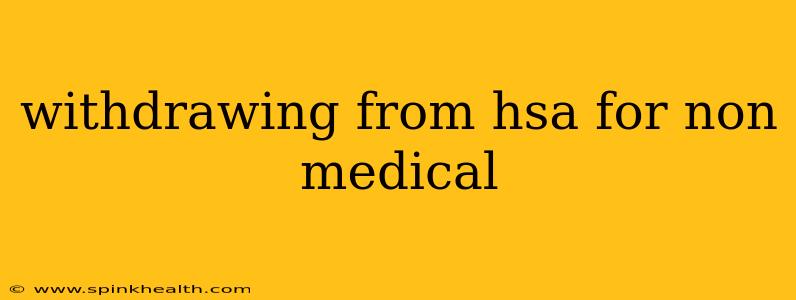The Health Savings Account (HSA) is a powerful tool for saving for healthcare expenses, offering tax advantages that can significantly boost your retirement savings. But what happens when you need the money for something other than a doctor's visit or prescription? Can you withdraw from your HSA for non-medical expenses? The short answer is yes, but it comes with a catch. Let's dive into the details.
Imagine this: you've diligently contributed to your HSA for years, building a healthy nest egg. Suddenly, an unexpected expense arises – a home repair, a down payment on a car, or even a much-needed vacation. The allure of tapping into those HSA funds is strong, especially since it's your money. However, before you make a withdrawal, understanding the tax implications is crucial.
What Happens When You Withdraw from Your HSA for Non-Medical Reasons?
Withdrawing from your HSA for non-medical expenses means you'll be subject to income tax on the amount withdrawn, plus an additional 20% penalty tax. This penalty applies until you reach age 65. After age 65, you'll still pay income tax on the withdrawal, but the penalty disappears. This is a critical point to remember – the tax implications significantly reduce the actual amount you end up with.
Think of it like this: you're essentially paying a hefty fee for accessing your funds early for non-qualified expenses. This penalty is designed to incentivize using HSAs solely for their intended purpose – healthcare.
Are There Any Exceptions to the Penalty?
While the penalty is generally in place, there are a few exceptions. These are often overlooked, so it's worth exploring them carefully:
After Age 65: The Penalty Disappears
As mentioned earlier, once you turn 65, the 10% early withdrawal penalty no longer applies. You will still owe income taxes on the withdrawn amount, but this is a significant relief. This makes strategic HSA utilization even more important as you approach retirement.
Reimbursement for Qualified Medical Expenses Incurred Before Opening Your HSA
While the funds must have been contributed after the HSA was opened, this is a niche situation, but it is possible to receive a reimbursement of pre-existing qualified medical expenses. This requires careful documentation.
Why Would Someone Withdraw from Their HSA for Non-Medical Expenses?
Despite the tax implications, some people might choose to withdraw for non-medical reasons. This could be due to:
- Urgent financial needs: Unexpected emergencies might force a withdrawal, even with the penalties. The cost of inaction might outweigh the cost of the penalties.
- Lack of awareness: Some individuals might not fully understand the tax implications before withdrawing.
- Long-term financial planning: Some might view the penalty as a cost of accessing funds that would otherwise be tied up until retirement.
What Are the Alternatives to Withdrawing for Non-Medical Expenses?
Before resorting to a non-medical withdrawal, consider these alternatives:
- Leave it alone: Let the funds grow tax-free and use them for medical expenses in the future or during retirement.
- Explore other savings options: Consider accessing other savings accounts or taking out a loan before resorting to your HSA.
Is it Worth it to Withdraw From My HSA for Non-Medical Expenses?
The decision of whether to withdraw from your HSA for non-medical reasons is a personal one. Weigh the urgent need for funds against the significant tax implications. Carefully consider the long-term financial consequences and explore all available alternatives before making a decision. Remember to consult with a financial advisor for personalized guidance.
This decision shouldn't be taken lightly. The tax implications are substantial. But understanding your options and their consequences empowers you to make the best choice for your financial well-being.

